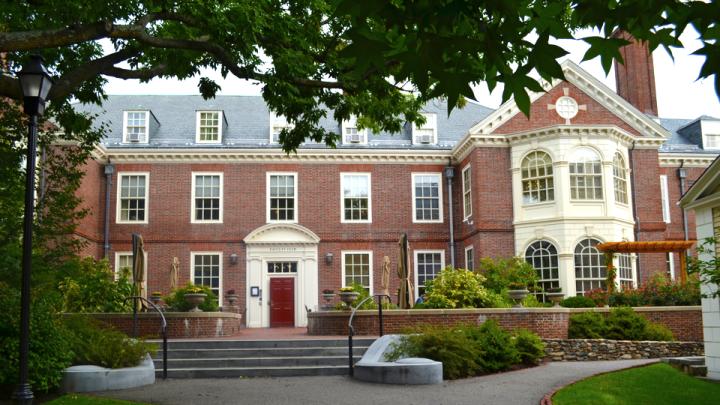Even as news broke that the Harvard Club of Boston had settled a class-action lawsuit brought on behalf of its waitstaff for $4 million, came the news that a nearly identical class-action complaint had been filed against the Harvard Faculty Club.
The complaint, entered September 20 in Middlesex Superior Court by attorney Shannon Liss-Riordan ’90, J.D. ’96, alleges violations of the Massachusetts tips law. The suit was brought at the request of two employees on behalf of themselves and other waitstaff at the Faculty Club and Loeb House, an event site across the street that is home to Harvard’s Governing Boards and their administrative offices. Liss-Riordan has won numerous such cases in the past, including suits against Hilltop Steak House, Starbucks, and Northeastern University, and represented the Harvard Club of Boston workers, as well.
The Massachusetts tips law requires that all proceeds from service charges and other gratuities be distributed to waitstaff. The law does allow employers to impose a house or administrative fee, such as a “usage” fee, but only by written description that “informs the patron that the fee does not represent a tip or service charge for waitstaff employees, service employees, or service bartenders.” (See Harvard Magazine’s coverage of the similar Harvard Club of Boston case.)
The Harvard Faculty Club has long advised customers not to tip waitstaff, but it does collect a surcharge that the suit describes as “in the general range of 18-22 percent. This surcharge,” the suit continues, “appears to patrons and guests to be a service charge that is added to food and beverage bills in lieu of a gratuity.” But “Harvard retains the proceeds of these charges for its own operating expenses,” the complaint alleges.
Liss-Riordan noted in an interview that the Faculty Club has in “the recent past” begun adding disclosure statements to some but not all bills. (She has copies of bills dated as recently as a month ago that do not include any statement about the disposition of the additional service charge.) “Unless employers are clear and consistent on all of their documentation that they show customers, customers are going to be confused by it,” she says. Furthermore, on those occasions when tips are left for staff (despite the Club’s instruction to customers not to do so), she says that those tips are not distributed to staff, in clear violation of the law. The complaint also alleges that the holiday gift intended for employees does not go entirely to the waitstaff, but in part either to defray operating expenses, and/or to reward management—yet another violation of the state’s tips law.
That law turns on the expectations of the customer, rather than the employee. If a reasonable customer believes that the service charge goes to waitstaff, then the money must go to the waitstaff.
“I’m hopeful, now that this has come to light, that [Harvard] will make good to their employees,” says Liss-Riordan, “and I expect and hope that the Harvard community will be supportive of the employees and call on Harvard to do the right thing.”
As the recent Harvard Club of Boston case makes clear, the stakes of such lawsuits are high. Since 2008, any violation of the state’s wage and hour laws, including those covering tips, mandates payment of triple damages as well as costs and attorney fees in successful cases. Previously, state judges exercised discretion over the awards, typically assessing treble damages only in cases of willful violation.
Harvard was not yet prepared to comment on the complaint as of the time of this post.
UPDATE: At 3:09 p.m., Harvard issued the following statement through a spokesperson: “We have not yet been served with the complaint and cannot speak to the claims it makes. However, it is worth noting that Faculty Club employees are paid more than double the average wage for restaurant industry workers and receive benefits that include health care, access to child care, four weeks paid vacation, and tuition assistance.”
The Harvard Club of Boston settled after noting similar circumstances, suggesting that the courts are focused on notification and disbursement of funds, so the level of compensation and benefits may not be decisive in how the litigation unfolds.
Full disclosure: The Harvard Faculty Club is part of the same Campus Services administrative group as Harvard Magazine Inc.









